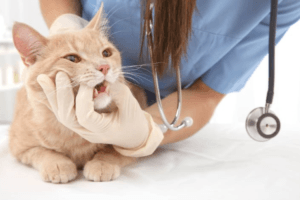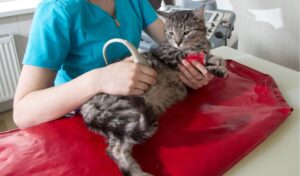FIV in Cats: Everything You Need to Know
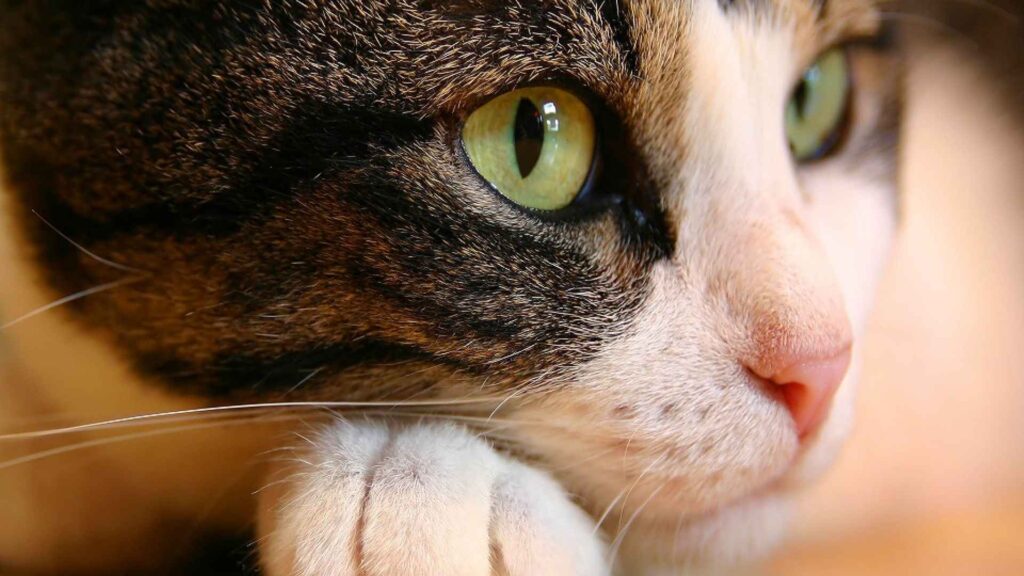
As a cat owner, you may have come across the term FIV. FIV, short for Feline Immunodeficiency Virus, is an infectious retroviral disease that affects cats. Similar to HIV in humans, it targets a cat’s immune system. It gradually weakens them and renders them more vulnerable to secondary infections.
To help you (as a cat owner) to better understand FIV, we’ve put together a comprehensive guide. From its causes and symptoms to diagnosis and treatment options. This guide has it all.
What is FIV in Cats?
FIV, or Feline Immunodeficiency Virus, is a viral infection that targets the immune system of cats, much like the human immunodeficiency virus (HIV) does in humans. The transmission of this virus occurs through bodily fluids such as blood, saliva, and semen, with bite wounds being the most common mode of transmission among animals.
This makes outdoor cats more susceptible to contracting the virus due to increased chances of close contact and potential aggressive encounters. However, a mother cat infected with FIV can also pass it down to kittens through the placenta. If you own an unspayed female cat with FIV, consider getting it spayed to prevent it from passing down FIV to its children.
As cat owners, this is another incentive to keep your indoor cat away from the outside world (to prevent it from getting into such fights), unless it is under your supervision.
It is also worth mentioning that infected cats can transmit the diseases only to other cats and not to humans or other animals (so don’t worry, your health is not at risk).
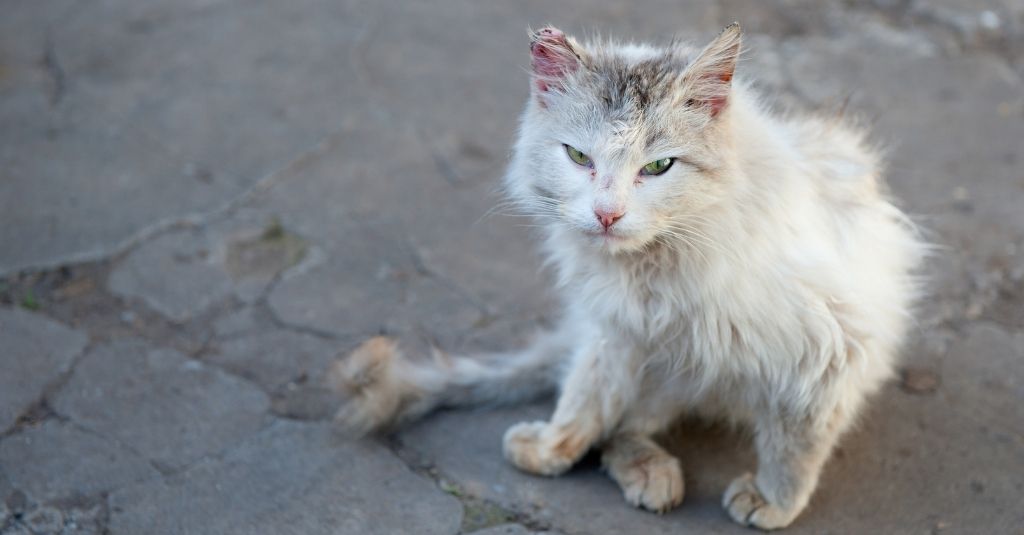
Symptoms of FIV in Cats
The virus is a type of slow-acting retrovirus that can take years for symptoms to appear. FIV-infected cats may show symptoms sporadically or get progressively worse over time.
It’s essential to know the signs of this disease in cats as they can vary widely and can be subtle and easily overlooked in the early stages of the infection. The most common symptoms include:
- Loss of appetite: Cats may experience a loss of appetite, leading to weight loss.
- Weight loss: As your cat begins to eat less, it will be losing weight.
- Lethargy: Infected cats may become lethargic and less active.
- Fever: Infected cats may develop a fever that can come and go.
- Enlarged lymph nodes: Cats with FIV may have swollen lymph nodes that are palpable.
- Dental problems: FIV-infected cats may experience dental problems such as gum inflammation, tooth decay, and oral infections.
- Skin infections: Cats with FIV may develop skin infections and sores on their skin.
- Chronic diarrhea: Infected cats may have chronic diarrhea that doesn’t respond to treatment.
- Respiratory infections: Infected cats may develop respiratory infections such as pneumonia.
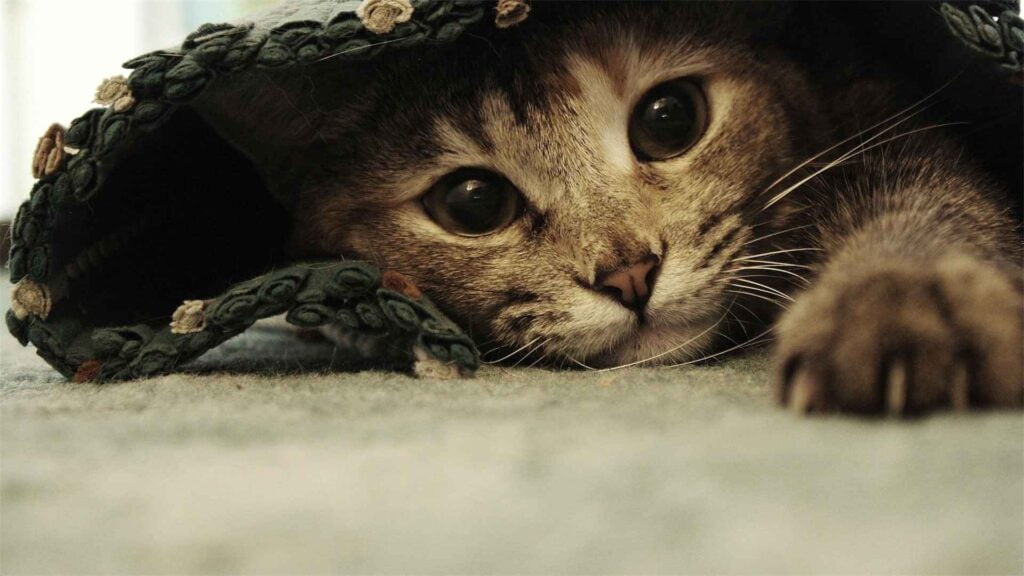
Diagnosing FIV
To diagnose FIV in cats, a series of tests is typically necessary, including (but not limited to):
- Blood tests (ELISA test, Western Blot test, IFA test)
- Urine tests
- Physical examination.
The blood test looks for antibodies to the virus, which indicates that the cat has been infected with FIV. However, it’s crucial to note that cats who have been vaccinated against FIV will also have antibodies, so it’s important to confirm the diagnosis with additional tests.
Kittens younger than six months of age who test positive for FIV may not be infected with the virus. These kittens should be isolated from other cats and retested after their maternal antibodies have cleared from their system, which typically happens at around six to seven months of age.
It is also highly recommended to run FIV tests on any new cat you might be bringing into your home, especially if you have uninfected cats at home.
Treatment Options for FIV in Cats
There are two possible cases of FIV-infected cats.
For FIV-positive cats that show signs of the disease, treatment is focused on managing secondary infections, keeping the cat indoors to prevent the spread of the disease, and extending the asymptomatic period. These cats should also be spayed or neutered.
For FIV-positive cats that don’t show signs of the disease, treatment includes a high-quality, balanced diet, parasite control, dental care, and appropriate mental and emotional enrichment for stress reduction. While there is no specific medication for treating FIV, some drugs can slow down the progression of the virus and reduce the risk of secondary infections. Immune-boosting supplements, such as L-lysine, can also help improve the cat’s immune system and reduce the risk of infections.
In addition to medical treatment, it’s important to provide a safe and comfortable environment for FIV-positive cats. This includes:
- Regular grooming
- Clean litter boxes
- Plenty of toys and activities to keep the cat entertained.
If your cat has FIV, regular checkups with a veterinarian every six months are crucial for monitoring the cat’s condition and preventing secondary infections.
With the right amount of care and treatment, FIV-positive cats can lead long and happy lives, just like any other cat.
What to do for your FIV-infected Cat (CheckList)
Here is a list of things for you to do for your FIV-infected cat.
- Regular Veterinary Check-ups: Routine check-ups with your veterinarian every 6 months to monitor your cat’s health status and solve any potential issues before they become a problem.
- Indoor Environment: Keep your FIV-infected cat indoors to minimize the risk of exposure, prevent fights with other cats, and reduce the risk of transmitting FIV to other cats.
- Balanced Diet: Provide a high-quality and balanced diet. Avoid foods that are known to cause allergies (high number of antigens).
- Hydration: Ensure your cat has access to fresh, clean water at all times to prevent dehydration.
- Parasite Control: Stay vigilant with flea, tick, and internal parasite control measures recommended by your veterinarian to help prevent additional health complications.
- Stress Management: Minimize stressors in your FIV-infected cat’s environment as much as possible, as stress can weaken the immune system. Provide plenty of hiding spots, comfortable resting areas, and opportunities for mental stimulation.
- Prompt Veterinary Care: Monitor your cat closely for any signs of illness or changes in behavior and seek veterinary care promptly if you notice anything unusual. Early detection and treatment of health issues are crucial for FIV-infected cats.
- Vaccination Protocol: Follow your veterinarian’s recommendations regarding vaccination protocols for your FIV-infected cat. While the cat’s immune system may be compromised, certain vaccinations may still be necessary to protect against other infectious diseases.
- Litter Box Hygiene: Maintain a clean litter box environment by scooping waste daily and providing regular cleaning to reduce the risk of urinary tract infections and other litter box-related issues.
- Education and Awareness: Stay informed about FIV and its management by educating yourself about the virus, its transmission, and the best practices for caring for an FIV-infected cat. Share this knowledge with family members and other caregivers involved in your cat’s care.
Conclusion
With proper care and management, FIV-positive cats can live long, healthy lives. If you suspect that your cat may have FIV, it’s important to take them to a veterinarian for a proper diagnosis and treatment.
By keeping your cat(s) indoors and providing them with a healthy lifestyle, you can help prevent the spread of FIV and keep your cat companion(s) happy and healthy.
